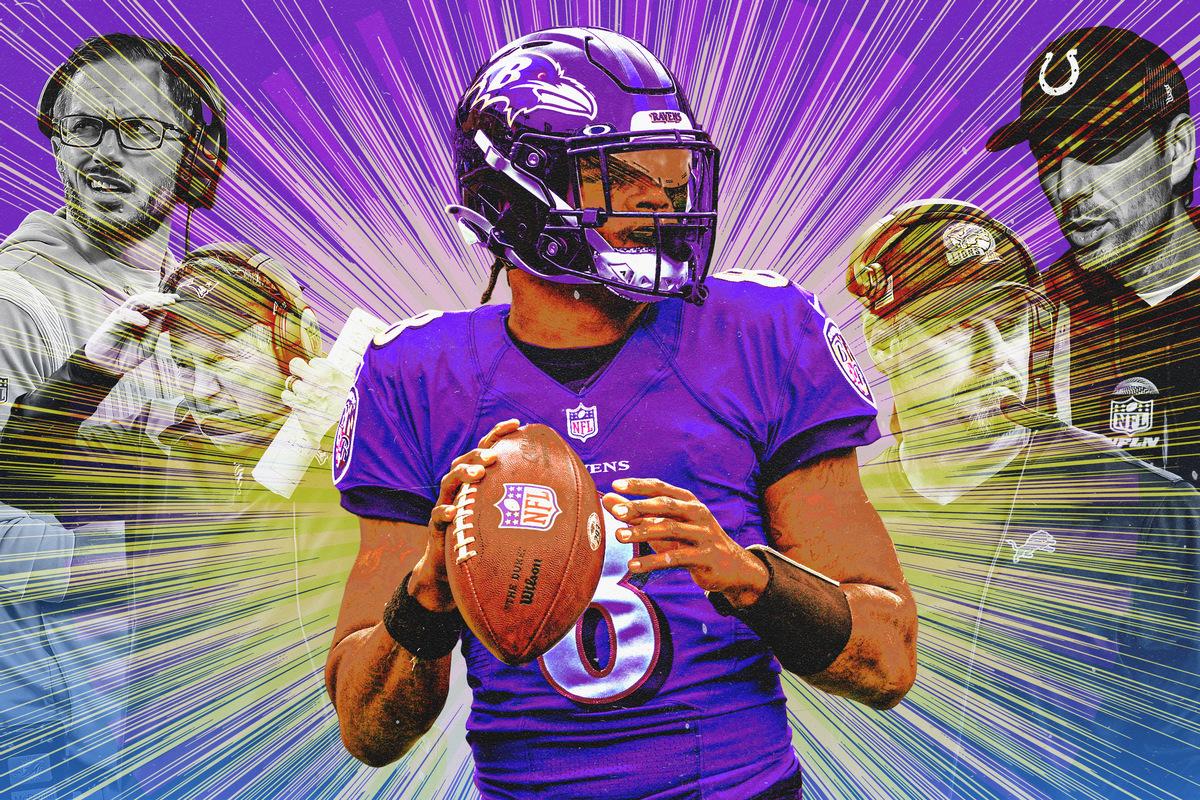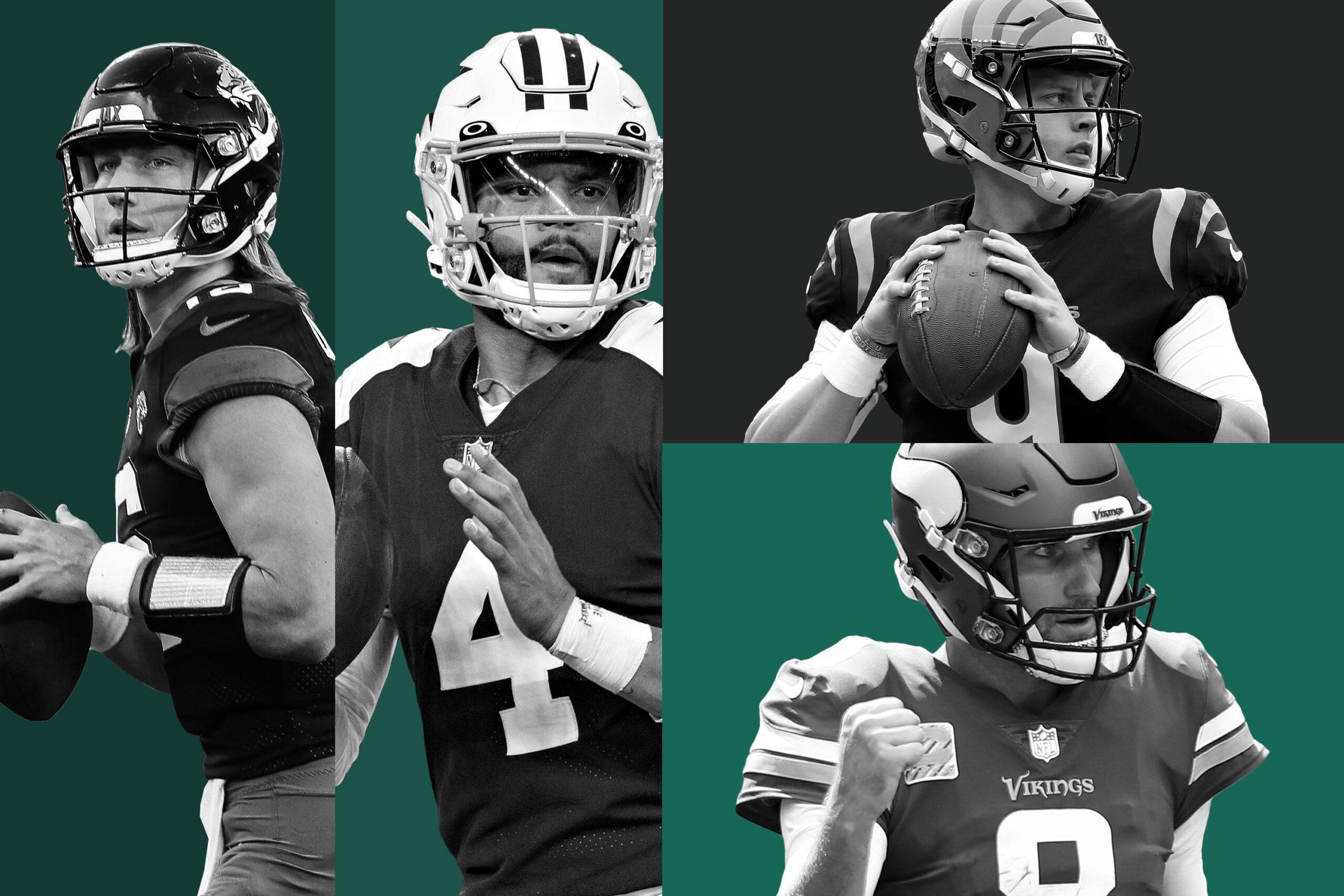
NFL teams are overthinking this, right? That’s my most charitable read of 31 franchises’ apparent uninterest in Lamar Jackson, a 26-year-old former MVP who says he demanded a trade from Baltimore on March 2, days before the Ravens used the nonexclusive franchise tag on him. Because of that tag, Jackson has been available to teams for a yet-to-be-determined contract figure and two first-round picks, yet none has jumped at the opportunity to sign him to an offer sheet. In fact, many have gone out of their way to say they are not interested in acquiring one of the NFL’s best players at its most important position. It’s … odd.
A less charitable reading of the situation might conclude, like DeMaurice Smith of the NFL Players Association did, that the owners are conspiring against Jackson to keep him from landing a fully guaranteed contract, much like the one Deshaun Watson signed in Cleveland last offseason. Smith wrote earlier this month, “In my nearly 15-year career as [NFLPA] Executive Director, I have never witnessed teams being so quick to publicly announce their lack of interest in an MVP quarterback, who is in his prime and who is also going to get an injury guarantee, regardless of his contract.” This is, after all, a league that fined two of its teams for not adhering to an unenforced salary cap during the 2010 season, largely because 30 owners were upset that Dallas and Washington failed to keep players’ salaries low in the midst of a labor dispute. This is also the same league that agreed to a settlement in Colin Kaepernick’s and Eric Reid’s collusion cases, which stated that teams had blackballed them due to their protests against police brutality and racial inequality.
But even if nothing nefarious is going on here, and this is just good old leaguewide incompetence, it wouldn’t be the first time these 32 teams have misevaluated Jackson. The same group allowed him to sink to the bottom of the first round of the 2018 draft because it was hung up on questions about his capacity to play quarterback from the pocket. And it appears teams are making the same mistake five years later.
The conversation around Lamar hasn’t changed much over the past half decade. Many still question his passing ability even though he ranks fourth in expected points added per play since 2018 among the 22 quarterbacks with at least 2,000 dropbacks in that span. The three ahead of him are Patrick Mahomes, Aaron Rodgers, and Tom Brady. There have also been questions about Jackson’s durability after he failed to finish each of the past two seasons. In 2021, it was an ankle injury. Last year, it was his knee that kept him out from Week 13 on and eventually forced him to miss Baltimore’s playoff loss in Cincinnati.
Given Jackson’s usage in the run game, it’s fair to wonder about his longevity. Since 2019, he’s racked up 580 rush attempts, according to TruMedia. No other quarterback has more than 458 carries over that time. He runs a lot and gets tackled more than most QBs. But it should be acknowledged that both injuries were suffered on run-of-the-mill passing plays.
In some ways, it’s understandable that owners have balked at some of the conditions Lamar is reportedly seeking. I’m not sure I’d feel comfortable giving Jackson—or any player, for that matter—a fully guaranteed deal. It’s not the most rational decision in a sport as brutal as this one. But this is also a league that doesn’t act rationally when it comes to the quarterback position. In 2018, San Francisco made Jimmy Garoppolo the highest-paid player in NFL history after he’d had just seven starts. Brock Osweiler landed a $72 million contract with Houston in 2016 after just seven mediocre starts. Hell, Carson Wentz was traded for a first-round pick just two years ago, and now the team that made that deal is saying two first-round picks for Lamar Fucking Jackson is just too much.
Meanwhile, Commanders coach Ron Rivera said this week that the team “never” looked into acquiring Jackson before ultimately deciding that a QB room of Jacoby Brissett and Sam Howell was good enough for them. Panthers GM Scott Fitterer cited the money as the reason Carolina didn’t pursue Jackson. Falcons owner Arthur Blank, whose team tried very desperately to trade for Watson a year ago, said Jackson has “missed five, six games each of the last two years. Each game counts a lot in our business.” Watson, of course, was suspended for 11 games last year after an NFL investigation found he “used his status as an NFL player as a pretext to engage in a premeditated pattern of predatory behavior toward multiple women.” Watson has also torn both of his ACLs, and he missed nearly his entire rookie season as a result.
If this is truly just about guaranteed money, then fine. The NFL is governed by a hard salary cap, and if one player is taking up a large chunk of the budget, it can be difficult to build a complete team, blah, blah, blah. But the thing that can’t be ignored in all of this is that we don’t actually know what Jackson’s contract demands are. He famously does not employ an agent—an agent who would likely be feeding the media details about his side of the negotiations with Baltimore. Instead, the information in reports is presumably coming from the Ravens, who have a clear incentive to paint his demands to be as absurd as possible. As these negotiations continue, the reports just keep getting stranger. It started with rumors of Jackson seeking a fully guaranteed deal, quickly followed by the quarterback sending out some cryptic messages about loyalty. But now we’re getting Adam Schefter tweets about an unlicensed agent calling teams on Lamar’s behalf—one who’s also promoting in-home gym equipment? It’s all very confusing.
What isn’t confusing, though, is how good Lamar Jackson is at playing football. You just need a set of eyes to know that he is one of the top talents in the sport and has been dominating it since the moment he stepped onto the field at Louisville. He’s a transformative player, capable of elevating any offense you drop him into: a top-10 offense starter kit all on his own.
As bleak as things may appear for Jackson at the moment, I have to imagine at least one team outside Baltimore will eventually make a play for him. He’s just too talented for that not to happen. So where are the best and most logical landing spots? And what might Lamar do for each of those teams? Let’s start with the current betting favorite:
Indianapolis Colts
Roll the video.
Sorry, Colts fans. It had to be done. I need you to remember that feeling of watching Wentz throw away a perfectly good season and waste a talented roster. That’s the effect a mediocre quarterback can have on a team. Meanwhile, for the ridiculously low price of two first-round picks (and around $50 million per year), you could have Lamar Jackson at the helm and not have to worry about that again.
Laughing at the Colts for their failed efforts to replace Andrew Luck isn’t going to break any new ground, so let’s not do that. But the season that ended with that Wentz disaster class is worth reexamining. As you may remember, that offense was led by running back Jonathan Taylor and a strong offensive line. Around that ground game, Frank Reich was able to provide Wentz with enough guardrails to help him to put up a decent stat line.
When you have to work around a quarterback’s limitations, though, there will always be an expiration date on the efficacy of the offense. Eventually, defenses will figure out a way to knock the offense off script and force the quarterback to win some games. It’s why we’ve seen so many midtier passers rise to prominence in cushy offensive situations only to fall from grace when teams are no longer able to prop them up.
In Taylor, the Colts had a home-run-hitting back capable of ripping off explosive runs. That made the offense viable even though it didn’t have a quarterback the coaching staff could trust to throw downfield often. But good defenses were able to contain those big runs, forcing the Colts to turn to Wentz to generate big plays. That’s when Bad Carson showed up.
Now, we can’t blame it all on Wentz. Indianapolis has struggled to fill out its skill group with other players capable of producing those explosive gains. When opponents took away Taylor’s big runs, Indy’s offense had to beat them one 4-yard gain at a time. That’s where Jackson comes in. We know he’s a far better passer than Wentz—we do know that, right?—but he also has a unique ability to produce in the run game. I covered this more in-depth early last season, but a designed run for Jackson has been even more efficient than your average Patrick Mahomes dropback.
Patrick Mahomes Passes vs. Lamar Jackson Designed Runs, Since 2018
That is a viable threat that doesn’t just go away if a defense can get the offense into obvious passing situations. The Ravens were still able to call Jackson’s number on run plays where other teams would have been forced to pass to have any chance of picking up a first down.
That puts tremendous stress on defensive coordinators. And as new Indy head coach Shane Steichen can attest, having a real run threat at quarterback makes calling offensive plays a whole lot easier.
New England Patriots
Noted NFL insider Meek Mill has already informed the Patriots that Jackson would be interested in joining the team, so at least we’ve cleared one hurdle. Whether that interest is mutual remains unclear, but owner Robert Kraft says it’s a decision he would leave up to Bill Belichick.
One would think that Belichick understands and appreciates the advantages that a quarterback like Lamar would provide to his team. As Kyle Shanahan has explained it, Belichick likes to play “the numbers battle” when devising his defensive game plans.
“He’s got 11 guys, and you’ve got 11,” Shanahan said of the Pats coach in 2020. “He knows he’s got to stop five [eligible receivers], and he’s going to rush four. He’s got [seven] left, but he wants to double this guy, so now he’s got [a defender] here, and it almost becomes math.”
Jackson is a player who changes that math. And that probably explains, in part, why Belichick has had trouble facing dual-threat quarterbacks in recent years. Belichick’s famed ability to take away what a team does best is stifled when he needs to have an extra set of eyes on the quarterback. Plus, when that quarterback is Lamar, the spy’s assignment becomes a lot harder. One false move, and this happens:
This is another way that Lamar changes the environment for his offense. With fewer bodies in coverage, a defense’s options are limited. The coverage calls can’t be nearly as complex, and because you need as many eyes on the quarterback as possible, it’s difficult to play man coverage, which asks defenders to turn their backs to the pocket and stick with receivers. The Ravens don’t see nearly as much man coverage as other teams, which is a big reason a passing game with no real receiving talent has managed to be productive when no. 8 is on the field.
Detroit Lions
Dan Campbell says the Lions already have a quarterback and therefore have no reason to pursue Jackson. In case you’re wondering, because I had to double-check Detroit’s roster after hearing that comment, Campbell was, in fact, talking about Jared Goff.
The Lions’ incumbent starter is coming off a great season in which he threw for over 4,400 yards and 29 touchdowns with only seven interceptions. But we’ve also seen this movie before, and it didn’t end well. At least not for Goff. After a rollicking start to his partnership with Rams coach Sean McVay, the Rams offensive line fell apart, McVay struggled to adapt his offense to defenses that had caught on to his play-action-heavy scheme, and Goff just wasn’t good enough to make up the difference.
Fast-forward a few years, and Goff finds himself back in an offense that makes his job a lot easier. The Lions’ run game is both brutally effective and exquisitely designed. When a defensive staff starts its prep for Detroit, run defense is the top priority. You can see it in how opposing coordinators call their defensive plays. You can see it in how Lions OC Ben Johnson, who stuck around after getting head-coaching looks this offseason, calls his plays.
Eventually, though, Johnson will leave for a head job, and the formidable offensive line will regress. It’s difficult to keep the band together in today’s NFL—especially when some of the more prominent band members ask for a raise—so eventually, Goff will have to prove he has evolved since his divorce with the Rams.
In the meantime, the Lions offense will continue to be a delicate ecosystem that relies on a strong, threatening run game to thrive. Jackson would change that. He is a dominant run game all on his own, and the past few seasons have proved that he doesn’t need to be paired with a similarly dominant offensive line to make his team’s ground attack potent. As long as he’s in the backfield, defenses will be forced to honor the run no matter how well it’s chugging along, and Johnson’s cache of play-action passes will remain viable. When defenses were able to beat Detroit on run downs last season, the passing game sputtered, and the offense couldn’t find a plan B. That would never be a worry with Jackson.
Miami Dolphins
We haven’t spent too much time on Jackson as a passer here, so let’s do that now. For whatever reason, the 26-year-old does not get nearly enough credit for his ability to throw the football. He can launch it 65 yards through the air, he can change his arm angle on any given throw, and he knows how to shape the trajectory of passes to get the ball over and around defenders. He’s a crafty passer, and you don’t need to look beyond his last full game to see it.
Around the 0:50 mark in that montage, I included a routine-looking pass—at least, the wide angle makes it look routine. From the end zone angle, you can see Jackson using his eyes to move a defender out of the throwing lane before whipping a sidearm pass to a slanting receiver. It’s a run-pass option and the kind of play that powered the Dolphins offense last season.
Miami’s RPO attack was spearheaded by Tua Tagovailoa. As limited as Tua may be as a passer—especially when it comes to arm strength—he is one of the better RPO operators in the NFL thanks to his sharp pre-snap processing and quick release. But Jackson isn’t far behind, and his craftiness as a passer and his creativity out of structure would add an element to the Dolphins’ passing game that Tua just can’t provide.
Really, all of Jackson’s strengths would help push this Dolphins offense into the elite tier. Miami’s sputtering run game would instantly become one of the better units in the sport. That threat would make it even harder for teams to help out against Tyreek Hill and Jaylen Waddle. And the constraints that Jackson’s scrambling puts on a pass defense would make it nearly impossible for opponents to employ the aggressive game plans that gave Tagovailoa problems later in the season.
The Dolphins are at the top of the list of the teams that should be pursuing Jackson. And that list should include nearly every team in the league. For some reason, though, the list seems to be shrinking by the day, and it’s looking more likely that this standoff will end with Jackson either signing with the Ravens or just sitting out entirely. That second option wouldn’t be fun for those of us watching from home—but it would certainly please the 31 defensive coordinators that would otherwise be tasked with stopping one of the very best players in football.


